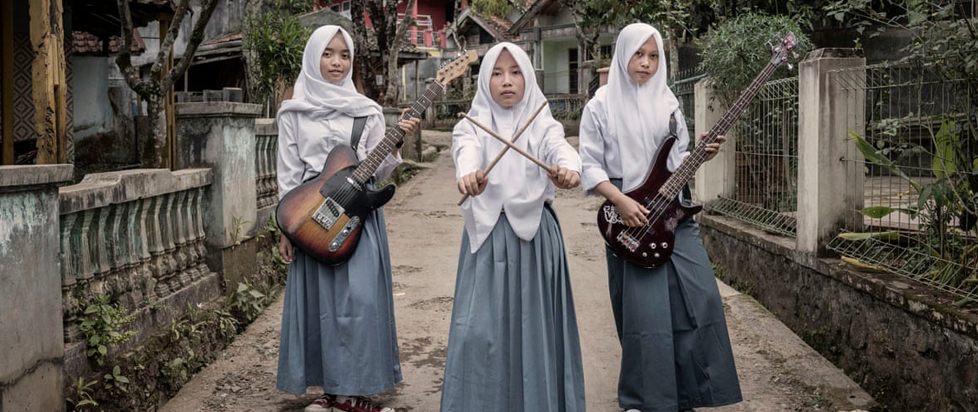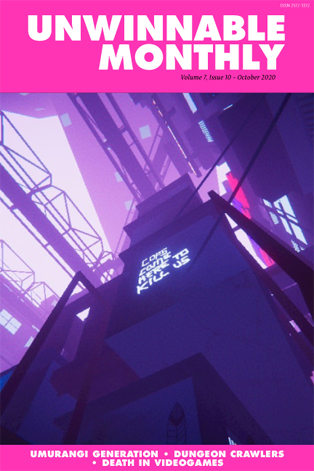
Indonesia
 This column is a reprint from Unwinnable Monthly #132. If you like what you see, grab the magazine for less than ten dollars, or subscribe and get all future magazines for half price.
This column is a reprint from Unwinnable Monthly #132. If you like what you see, grab the magazine for less than ten dollars, or subscribe and get all future magazines for half price.
———
Globetrotting through media.
———
Welcome to this month’s edition of World Tour! So get your bowl of nasi goreng ready and let’s dive in!
Voice of Baceprot
To kick us off we’ve got Voice of Baceprot, a metal trio from Indonesia. They’ve only got a few songs out, but each of them is incredible. There’s an energy to their music which is impossible not to vibe with and feel that spirit of rebellion. Though often not the focus, the vocals on each track are entrancing and powerful. They also mix rap and metal in a way that actually works really well – which is more than can be said, which is more than can be said for most attempts to synthesise the two.
What makes this trio unique, apart from their talent, is that they started as a group of schoolgirls in one of the more conservative parts of Indonesia (West Java) who found the heavy metal records collected by their music teacher (who is now their manager) and got into metal from there.
 It would be extremely easy to force them into the gaze of Western liberal feminism, which crafted the bans on Islamic veils in French law. I could create a narrative about Muslim schoolgirls breaking free of an “oppressive faith” and moving into modernity (as defined by the Christian West). In fact, a lot of the pieces written about them do exactly that – almost treating them like a curiosity rather than a group of artists. It’s true that there are complicated gender politics within Islam (especially around the veil), and constant ongoing conversation within various communities. However, a trio of sixteen-year-old girls forming a metal band and performing on their country’s biggest talk show is groundbreaking anywhere – especially in metal, where the mainstream is so dominated by men.
It would be extremely easy to force them into the gaze of Western liberal feminism, which crafted the bans on Islamic veils in French law. I could create a narrative about Muslim schoolgirls breaking free of an “oppressive faith” and moving into modernity (as defined by the Christian West). In fact, a lot of the pieces written about them do exactly that – almost treating them like a curiosity rather than a group of artists. It’s true that there are complicated gender politics within Islam (especially around the veil), and constant ongoing conversation within various communities. However, a trio of sixteen-year-old girls forming a metal band and performing on their country’s biggest talk show is groundbreaking anywhere – especially in metal, where the mainstream is so dominated by men.
VoB are all about pushing past these expectations and making music on their own terms. In an interview with the Guardian, Kurnia, their vocalist and guitarist said “I think what we want to say to the young women of Indonesia is, don’t be afraid of being different. Don’t be afraid to shout your independence.” That’s what they’re constantly doing in every song, shouting their independence. Pushing free from both the conservatism of their home province and the expectations of the ‘liberal’ Western gaze they’re starting their School Revolution and there’s nothing any of us can do about it.
The Act of Killing
From 1965-66, the military and various militias killed anywhere between 500,000 and three million people suspected to be Communists in the space of a year. Killings were often arbitrary, or based on someone being of Chinese heritage, and ripped through families and communities. The US had intimate knowledge of these killings but didn’t even make a public statement about them.
This documentary covers a group of the perpetrators nearly 50 years later, asking them to recreate the atrocities they committed for a film of their own.

The first thing that hits you about the documentary is the nonchalance with which the men discuss these grizzly killings. They’re not Nazis hiding in Argentina, people know exactly who they are and what they did. Josh Oppenheimer (the documentarian) hardly has to do any prodding at all. Instead, they gush endlessly about what they did. They give locations, methods, their state of mind, their thought process as they did this. All of this feels less confessional and more like old men recounting war stories. There’s that same wistful tone, those same rose-tinted glasses we all see in our elders as they recount times gone by.
There is a boisterous joy and camaraderie to a lot of these men and the quasi-fascistic paramilitary group Pancasila Youth which grew out of the original death squads. For most of the documentary, it’s not solemnity or horror behind the eyes – it’s unadulterated joy. That’s the terrifying thing. Part of the way, Ibrahim Sinik, a newspaper publisher, is asked about his role in the killings. What gets him fired up isn’t the accusation that he was involved in apocryphal interrogations for nonsense information which justified many of these murders – he even brags about it. What insulted him was the insinuation that he got his hands dirty. He ended up shouting “Why would I do such grunt work? Why would I kill people? Just one wink from me and they’re dead.”
With villainous monologues like this and the many other disgusting things admitted to in the documentary, it would be so easy to characterize these men as monsters. Soulless beings wearing human shells that were destined to be that way — bearing no resemblance to us at all. But the most effective part of the documentary, especially the longer director’s cut, is reiterating that these men are people. Gangsters and rapists and murderers and exploiters and class traitors and chauvinists but still fundamentally human. You see these men joke, carry their children, drink and sing. You watch one of them brush his teeth in the morning. You watch another retch and struggle to spit out phlegm.

Crucially, the longer you watch, the more you see how pathetic these men are. Their brazenness and celebration of their action is ultimately a façade, covering for the fact that they are for the most part deeply traumatized by the heinous acts they committed. The main person we follow, Anwar Congo (who was said to have killed 1,000 people in the massacre) can’t sleep at night, he’s too haunted by the memories of what he did, yet by day he’s paraded around as a war hero — even appearing on national TV. You can always see the desperation to cling onto the narrative that they were righteous. Even a flimsy fantasy is easier to cope with than accepting guilt for the atrocities. This appears most distinctly in two moments:
The first is when mid-way through filming, one of the men working on the film bares his soul and talks about how his Chinese stepfather was taken by the paramilitary troops. He then starts describing finding the body with his grandfather and burying it in a shallow grave. Whilst telling this he’s giving a terrifying forced laugh – as if framing his trauma as comedic is the only way he can cope and be allowed to tell it. However, a soon as he’s done, the ex-paramilitary men say that the story can’t be included. They give various excuses, saying it will make the film too long, or too sad. But the reality is that it would challenge their narrative as the men who did what needed to be done, even if their methods were extreme. Any complication topples their house of cards.
The second is when our central figure Congo, mass killer and hero of the Pancasila Youth, acts as the victim in one of the killings he’s done a thousand times — and he breaks. He panics and refuses to do another take, it’s like it finally dawned on him that the people he did this to were real, and they felt fear and pain. He even tries to say that he gets it now, that he feels what they felt — though Oppenheimer immediately and correctly pushes back on this, telling him that their fear was unimaginably worse because he knew that ultimately he would live.

In displaying their wretched humanity Oppenheimer refuses to Other them. They’re not foreign barbarians who haven’t been civilized yet. In fact, they are directly influenced by the US. Congo was inspired by Hollywood for some of his methods of killing, saying “When I was young I always watched American films and imitated them.” Now this isn’t to say that the American Western genre is responsible for this mass killing, but it does serve as a useful pointer for the way that the American (and broader Western) imperialism was and is the biggest exporter of violence globally – especially in killings like this which are born out of the Cold War. This violence is much bigger than Indonesia.
In the world we inhabit we eat, sleep and breathe violence. Capitalism and the plethora of hierarchies it intertwines with require that human relations are consumptive and competitive. Within capitalism, all we can do is create flimsy narratives to justify and ignore that violence and offload it onto the global South. One of the men involved in the killings actually wears a shirt that says “Apathetic” on it. Much like the men in The Act of Killing, we tell obvious lies to each other and to ourselves so that we can continue to live our lives without being burdened by the guilt of the violences we are all complicit in (to varying degrees) – particularly in the global North.
That’s why Gone With the Wind is/was revered and why we’re inundated with period pieces that refuse to meaningfully interrogate the class/colonial violence that this splendor is built upon. To acknowledge that our soil is fed by the bones of the exploited and the enslaved is burdensome, but it is absolutely necessary. Otherwise we let those violences happen again and again and again. That violence which creates prisons where there should be community centers because it’s more profitable to use Black and Brown people for slave-like labor. That violence which uses venture capital to turn desperate people into the henchmen of landlords to make people houseless during a pandemic, instead of helping to improve their conditions. That violence which consumes endlessly as the world burns.
The time for the façade is over.
———
Oluwatayo Adewole is a writer, podcaster and general procrastinator from London. You can find their ramblings @naijap-rince21 and their poetry @tayowrites.




